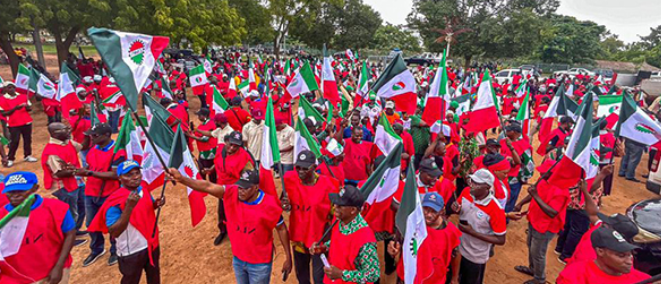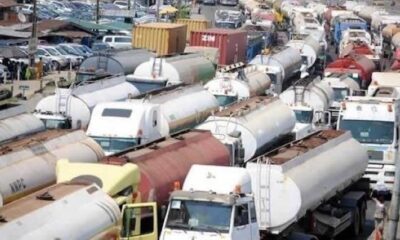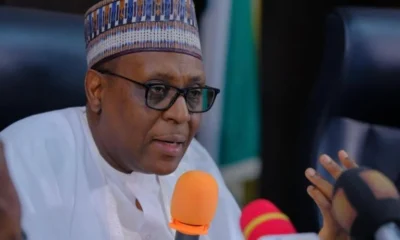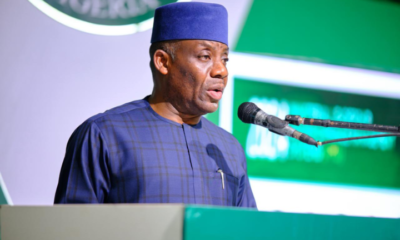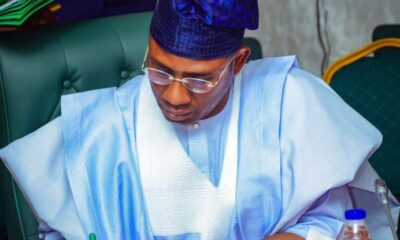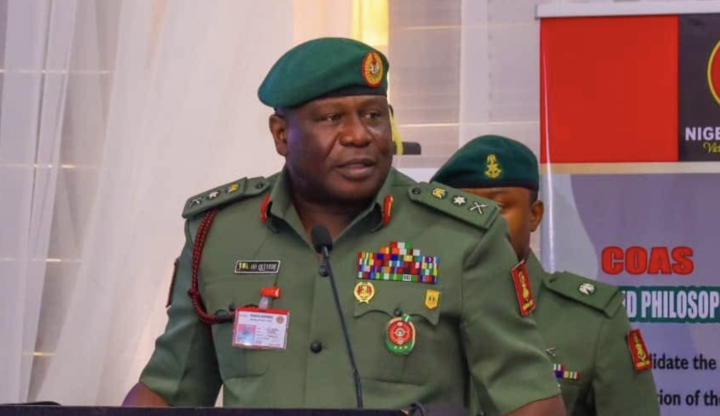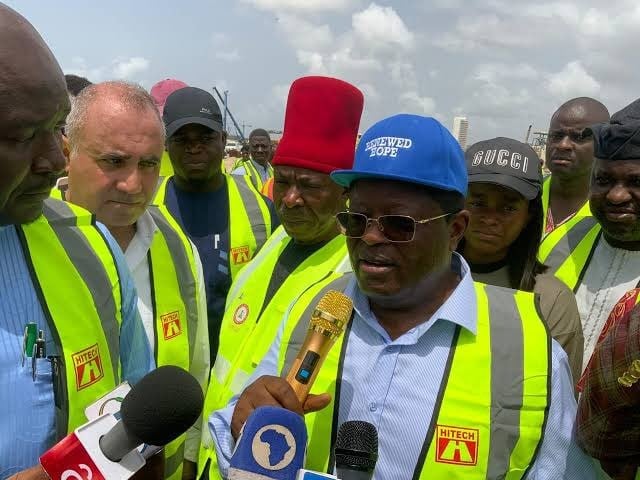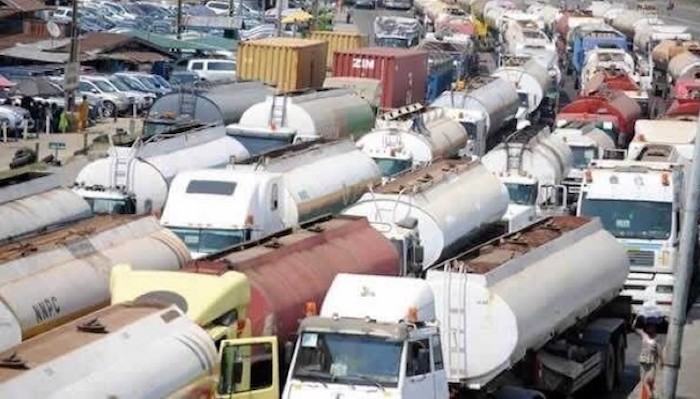The Nigeria Security and Civil Defence Corps (NSCDC) on Sunday issued a warning to the Nigeria Labour Congress (NLC) regarding its planned shutdown of telecommunication services on March 1, in response to the recent 50% tariff increase.
Both the Private Telecommunications and Communications Senior Staff Association of Nigeria and the Association of Telecommunications Companies of Nigeria also opposed the NLC’s planned boycott of telecom services and shutdown of infrastructure, arguing that such actions were ill-advised and could negatively impact the industry.
Babawale Afolabi, spokesperson for the NSCDC, told The Punch on Sunday that the agency had stationed operatives at base stations to prevent any unlawful actions by protesters.
The NSCDC, responsible for safeguarding critical national infrastructure like telecommunications, raised concerns about the potential threats the NLC’s actions could pose to national security and public safety.
The NLC announced its intention to shut down the operations of telecommunications companies across the country if the tariff hike announced by the Nigerian Communications Commission was not reversed by the end of February.
The union directed Nigerians to boycott the services of major telecom providers, including MTN, Airtel, and Glo, daily between 11am and 2pm starting February 13 and continuing through the month.
The NLC in a communiqué signed by its President, Joe Ajaero and General Secretary, Emma Ugboaja, accused the telecom operators of breaching public trust by implementing the tariff hike before the conclusion of a 10-man review panel’s deliberations.
The union also faulted the government for failing to protect citizens from corporate exploitation.
The NLC argued that the tariff increase represented a betrayal of public trust, given the earlier agreement to establish a committee to review the proposed hike.
However, the NSCDC urged the NLC to reconsider its planned protest, warning that any disruption to telecom services could expose the country to criminal activities and compromise national security.
Afolabi made it clear that the agency will not allow any action that could jeopardise the security of the nation.
He revealed that state commandants had been directed to maintain round-the-clock surveillance at telecom facilities, with a nationwide deployment of officers, including undercover operatives, to ensure the protection of these assets.
Citing the importance of telecommunications to national security, the corps warned that any disruption could result in vandalism and other criminal activities.
He added, “Already, the NSCDC commandant-general has directed state commandants to maintain round-the-clock surveillance in and around all the telecom masts in their locations.
“Also, there is going to be nationwide massive deployment of the officers and men of the corps, including undercover and intelligence operatives, to maintain peace and ensure that all the government and corporate organisations’ critical national assets and infrastructure are protected from the miscreants who might likely use the opportunity of the planned protest to carry out their criminal activities.’’
“Available credible intelligence already established the fact that the planned protest will be hijacked by hoodlums and that is why the NSCDC is on top of the situation,” he further stated.
The NSCDC called for dialogue to resolve the dispute and hoped that the NLC would reconsider its stance.
Afolabi stated, “The NSCDC, under the leadership of Commandant-General, Dr. Ahmed Audi, is appealing to the organized labour under the umbrella of the Nigeria Labour Congress to shelve their planned protest of March 01, 2025 and the move to shut down telecommunication facilities nationwide.
“Although peaceful protests are allowed under the law, experience and fallouts of similar threats in the past necessitate the need to appeal to the NLC not to embark on any action that will further affect the security of the country.
“NSCDC will not fold its arms and allow any action that will expose the nation’s security and eventual compromised economic stability and public safety, under the guise of protesting the increase in telecom services tariffs.
“The scars of similar protests that turned violent in the past are still there as reference points and the NSCDC and other security agencies in the country will not allow the miscreants, hoodlums and other non-state actors to hide under the guise of NLC protest to loot and vandalise government and corporate organisations assets and infrastructure.”
The NSCDC stressed its commitment to safeguarding the nation’s critical infrastructure and stated that it is prepared to take decisive legal action against those who attempt to undermine the security of the country.
“The NSCDC is committed to safeguarding the lives of Nigerians and property of the government and corporate organizations we are ready to take decisive actions against any individual or group that embarks on any action that can jeopardise the security architecture of the country,” he added.
The corps said it has placed its personnel on high alert and warned that anyone found engaging in illegal activities during the protest will be dealt with according to the law.
“We still believe that dialogue remains the best solution and we hope that organised labour will listen to the voice of reason and jaw-jaw with the government. We advise organised labour leaders to stay away from base stations and telecom mast locations as NSCDC personnel have been placed on red alert.
“Anybody found wanting will be dealt with according to the stipulated law of the country,” the spokesperson cautioned.
The Private Telecommunications and Communications Senior Staff Association of Nigeria criticised the NLC over its planned protest.
The Secretary-General of PTECSSAN, Abdullahi Okonu, told The PUNCH on Sunday that the union had already made its position clear, arguing that the increase is necessary to prevent a collapse of the industry.
In a letter addressed to the NLC, PTECSSAN said the labour congress had acted “in error” by taking decisions without consulting the union, which represents workers in the telecom sector.
“It is our firm belief that the Congress Leadership has acted in error in taking these decisions without prior consultation with our union that operates in the sector,” the letter read.
“Perhaps, getting in touch with us to provide you with information on the happenings in the sector would have assisted the Leadership in taking a better decision than it had taken,” it further said.
The union acknowledged the concerns over the impact of the tariff increase on consumers but insisted that the hike was unavoidable due to rising operational costs.
PTECSSAN pointed to the removal of fuel subsidy and the subsequent surge in petroleum prices, which have significantly increased the cost of maintaining telecom base stations across the country.
On its part, the Association of Telecommunications Companies of Nigeria urged the labour unions to suspend its planned rally, pointing out that there had been no formal engagements or discussions with the telecom operators before the union’s decision.
ATCON president Tony Emoekpere criticised the planned boycott of telecom services and shutdown of infrastructure declared by the workers’ union.
“This isn’t a labour issue; it’s an industry-wide challenge. Interest rates, for example, fluctuate constantly, yet banks don’t shut down in protest. These economic policies affect all sectors, not just telecoms. So why single out our industry?” Emoekpere said.
He emphasised that while concerns about service quality are valid, expecting businesses to operate at a loss is unsustainable.
“If the goal is better service, let’s have that discussion. But resorting to actions that could disrupt the industry and the economy isn’t the way forward,” he added.
The telecom executive further stated that telcos are solely focused on improving services that will be beneficial to subscribers and get value for their money.
But speaking (with The Punch), the Lagos State NLC Chairperson, Funmi Sessi, rejected the warnings from the NSCDC, making it clear that Labour would not be cowed by threats.
“No one can threaten us – no one! This is about our commonwealth, our joint heritage. Civil Defence officers are merely working for their pay, but they have no authority to dictate to us. If necessary, we will shut down the electricity itself! Who are they to tell us otherwise?” she declared.
She further lambasted the security forces for attempting to intimidate workers, saying, “Let them threaten all they want, nothing will stop us. We know the song we sing: how many people will the soldiers kill? Even the police must remember to remain civil. They cannot kill us all!”
Credit: The Punch

 BIG STORY4 days ago
BIG STORY4 days ago
 BIG STORY2 days ago
BIG STORY2 days ago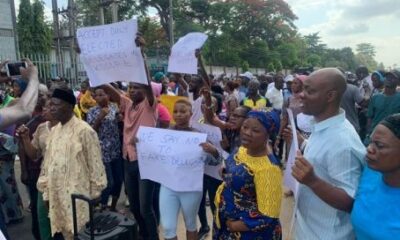
 BIG STORY4 days ago
BIG STORY4 days ago
 BIG STORY4 days ago
BIG STORY4 days ago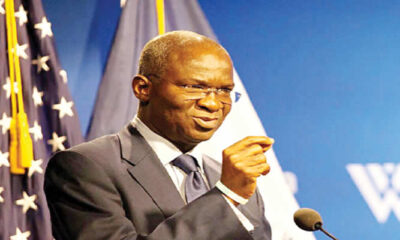
 BIG STORY2 days ago
BIG STORY2 days ago
 BIG STORY3 days ago
BIG STORY3 days ago
 BIG STORY4 days ago
BIG STORY4 days ago
 BIG STORY4 days ago
BIG STORY4 days ago




